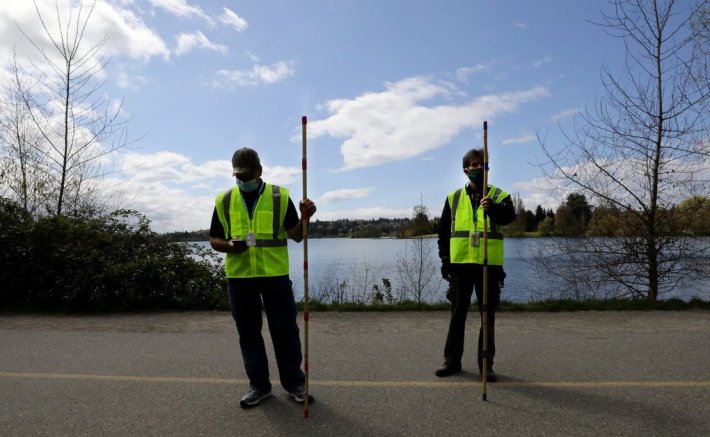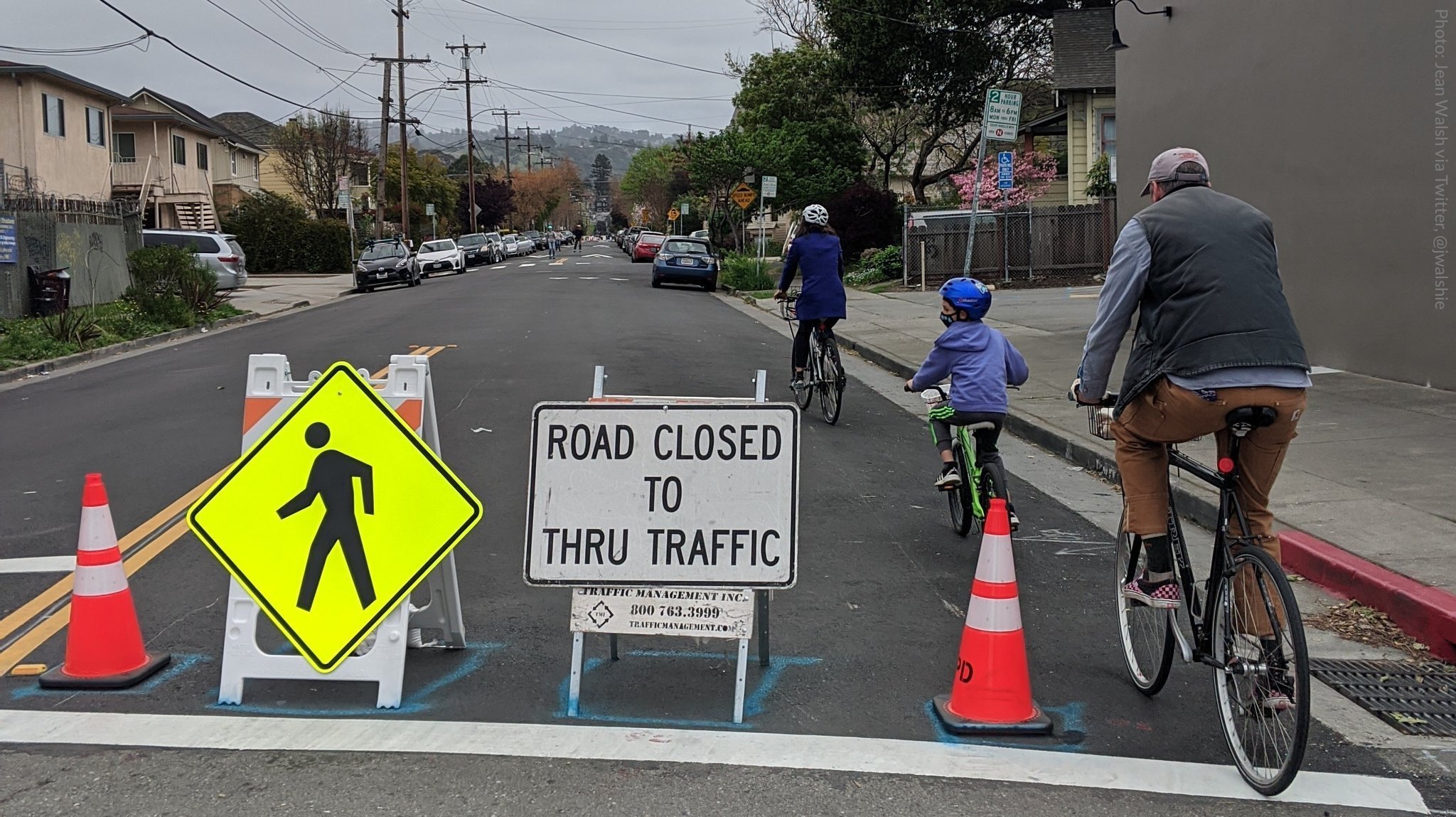For us at Streetsblog Chicago, arguing for making more room for safe, socially-distanced walking and biking in the time of COVID-19 has sometimes felt like being voices in the wilderness.
Of course, we weren't the only ones doing this. Kyle Lucas, an essential worker with HIV who can't ride transit during the pandemic, launched a petition to reopen the Lakefront Trail for biking and opening streets to pedestrian and cyclists -- something just about every major blue-state big city is doing right now. The petition is currently closing in on 1,300 supporters.
Audrey Wennink from the Metropolitan Planning Council and Sam Kling from the Chicago Council on Global Affairs have lobbied city officials to consider converting currently-near-empty parking lanes to space for pedestrians and bike riders, and implement Oakland-style "Slow Streets," prohibiting through traffic on side streets to enable safe walking and biking. They noted that, once Illinois' Stay at Home order is lifted and workplaces reopen, people will still be wary of transit, so unless we encourage walk/bike, there's going to be a harmful spike in driving.
And yesterday Steven Spinello and other students from the University of Chicago's Harris School of Public Policy launched yet another petition and letter to mayor Lori Lightfoot calling for reopening the LFT and implementing Slow Streets. And many, many more Chicagoans voiced support for these ideas on social media and in Streetsblog's comments sections.
But the reason why our campaign still felt kind of lonely was that Chicago's leading sustainable transportation advocacy organization, the Active Transportation Alliance, was missing from this conversation. Or, rather, ATA was actively discouraging our efforts to make more room for walking and biking during the crisis.
In an April 7 blog post, ATA wrote that "The context of a pandemic does not seem like the most appropriate moment to be pushing forward this vision." They said an open streets program would probably be too expensive and resource-intensive, distracting from efforts to help hard-hit communities of color during the pandemic, and that it would almost certainly require lots of extra policing. Shortly after that, the Oakland experience disproved those claims. But anyway, the advocacy group wrote, "The needs of this moment mean we must do… a lot less [walking and biking], if at all."
After Streetsblog hammered ATA on the issue in countless articles, and a dozen or so major U.S. cities demonstrated the benefits of opening streets and other strategies to capitalize on this unique moment in modern history when driving has plummeted, the advocacy group softened its position a bit in an April 30 blog post. “We are excited to see [open streets] being adopted by more people and places,” the new post stated.
Still, as SBC's Courtney Cobbs wrote, the new statement was frustrating. While ATA expressed lukewarm support for opening streets, the post indicated that the group still wasn't planning to actually advocate for them. Instead, it argued that “Creating more road space for walking and biking in your community should be a locally-driven effort,” spearheaded by civilians. The group suggested that residents, not ATA, contact local officials to lobby for open streets in their neighborhoods and suburbs, essentially passing the buck.
ATA also provided a long list of equity-related questions citizens should ask themselves before advocating for open streets. But the group apparently hadn't considered the potential social justice impacts of doing nothing, and the resulting increase in car-dependency, congestion, pollution, and crashes. Worse, while the post acknowledged that many people are calling for more space for walking and biking in majority-white North Side neighborhoods, it implied that African-American and Latinx residents on the South and West sides probably wouldn’t be interested in such initiatives.
But today there was a major breakthrough as ATA acknowledged in a new blog post that it needs to do its part to help prevent a post-pandemic carpocalypse, by actually advocating for walk/bike initiatives during COVID-19. On top of that, the group says it has already started to bend the ears of local officials on these matters, and the Chicago Department of Transportation is getting in on the action as well.
It was good to see the advocacy group finally give a nod to the widespread criticism it's been receiving for its foot-dragging. "We’ve been listening to feedback from our supporters about open streets... we regret that some supporters got the impression we’re against any changes to street design during the pandemic."
It was satisfying to see ATA admit that we're going to face carmaggedon if we do nothing now to prevent it. "As restrictions ease and travel increases, walking, biking, and transit must be safe and reliable options so we don’t see a harmful jump in driving."
To meet this challenge, the advocacy group proposed the following "toolbox of possible solutions," all of which Streetsblog and other advocates and journalists been pushing for multiple weeks:
- "Developing 'recovery networks,' which include new bikeways to support trips while transit capacity may be limited." (Yup, Courtney suggested that two weeks ago. She emphasizes that these bike lanes "need physical protection. With increased speeding and more severe crashes during Stay at Home, paint on the ground won't be enough to entice people to bike, nor provide adequate protection from drivers.")
- "Expanding sidewalk space in busy commercial corridors and business districts." (Yessiree, we proposed that idea back on April 6.)
- "Tap into our strong residential street network to create greenways and calm spaces for walking and biking. "(You mean, like open streets and Slow Streets? We were talking about that even before Mayor Lightfoot shut down the Lakefront Trail, the Chicago Riverwalk, and The 606 on March 26.)
- "Plans for re-opening the Lakefront Trail could include requirements to keep moving and travel solo or with members of your own household. Non-police city personnel could monitor and encourage social distancing." (Using non-cop city workers to promote social distancing on the lakefront? We proposed that the day Lightfoot closed the shoreline. A Seattle-style "Keep Moving" rule in parks? Tribune columnist Mary Schmich brought up that idea on April 24.)

I suppose it's a little annoying that Active Trans is now bringing up these ideas, which they previously said were inappropriate to advocate for, as if they just recently dreamed them up. But I'm so happy about this change of heart that I'm willing to let it slide.
I'm also delighted to read that Active Trans is "sharing and discussing these ideas and others with Chicago mayor Lori Lightfoot, the Chicago City Council, and the Chicago Department of Transportation. We’re also supporting suburban advocates who are reaching out to their local leaders." All good stuff, albeit steps that they should have been doing more than a month ago.
In addition, it's encouraging that CDOT is taking some (baby) steps on the aforementioned ideas. ATA writes that the department is asking residents to share their observations of pandemic transportation and public space issues -- like dangerously crowded sidewalks and speeding drivers endangering cyclists -- and to provide suggestions for addressing these problems. You can provide input at covidmobility@cityofchicago.org. Be sure to mention details about the issue such as the nearest intersection.
Active Trans ends this latest blog post by reiterating the importance of prioritizing input on these potential solutions from residents of the African-American and Latinx communities that have been hardest-hit by the pandemic. Obviously that's an important principal, and one that Streetsblog Chicago strongly endorses.
So I'd like to congratulate the Active Transportation Alliance for coming around to a commonsense position on open streets and its role as a transportation advocacy organization during the pandemic. Sure, Streetsblog and others have pushed these ideas for many weeks, back when ATA implied that was irresponsible. But, hey, if they follow through with their promise to help prevent a dangerous post-pandemic increase in car use, all is forgiven.
Here are some tips on preventing the spread of COVID-19, and advice for Chicagoans on what to do if you think you may have been exposed to the virus.





